Mathematics
Department vision
Welcome to the Mathematics Department at Stone Lodge School. Our vision is to develop excellent problem solvers who are fluent in the basics of math and use mathematics to model real-world problems. We believe that all students can succeed in mathematics, given the right support, guidance, and mindset.
To empower our students to overcome barriers and make informed financial choices as engaged citizens in the future, we focus on developing their mathematical tools and critical thinking skills. To achieve this, we engage students in regular retrieval practice, guided practice, and checking for understanding. Our students also engage in problem-solving tasks, real-world applications, and communication of mathematics through active listening, reasoning, and class discussions.
We take pride in fostering a growth mindset among our students and encouraging them to persevere in finding efficient solutions. Our motto, “All students can succeed at maths, with the right support, guidance, and mindset," is at the core of everything we do.
Our dedicated and experienced teachers are committed to providing students with the support and guidance they need to succeed in mathematics. We look forward to working with you and your child to help them reach their full potential in mathematics.
Year 7
Year 7
Key Stage 3
The long-term plans at KS3- Year 7, Year 8, and Year 9, include a focus on topics such as algebraic thinking, fractions, proportional reasoning, data collection, and geometry. Our curriculum is designed to give students a sturdy foundation in the basics, while also challenging them to think critically and apply their knowledge to real-world scenarios.
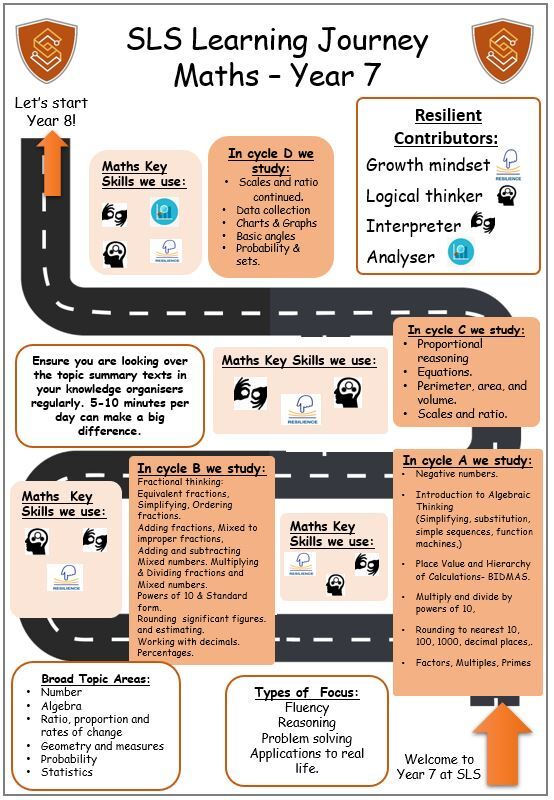
|
Cycle A |
Introduction to Algebraic Thinking Number Place Value and Hierarchy of Calculations Multiply and divide by powers of 10, BIDMAS Rounding to nearest 10, 100, 1000, decimal places, significant figures. Factors, Multiples, Primes: LCM and HCF. Prime factor decomposition. |
|
Cycle B |
Fractional thinking: Equivalent fractions, Simplifying, Ordering fractions. Adding fractions, Mixed to improper fractions, Adding and subtracting Mixed numbers. Multiplying & Dividing fractions and Mixed numbers. Powers of 10 & Standard form. Rounding and estimating. Working with decimals. Percentages. |
|
Cycle C |
Proportional reasoning Equations. Perimeter, area, and volume. Scales and ratio. |
|
Cycle D |
Data collection Charts & Graphs Basic angles Probability & sets. |
Year 8
Year 8
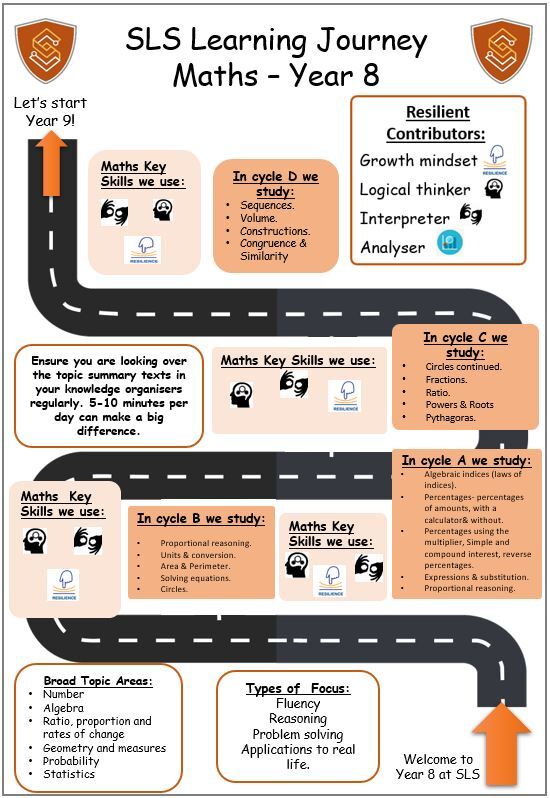
|
Cycle A |
Algebraic indices (laws of indices). Percentages- percentages of amounts, with a calculator& without. Percentages using the multiplier, Simple and compound interest, reverse percentages. Expressions & substitutions. Proportional reasoning. |
|
Cycle B |
Proportional reasoning. Units & conversion. Area & Perimeter. Solving equations. Circles. |
|
Cycle C |
Circles continued. Fractions. Ratio. Pythagoras. |
|
Cycle D |
Powers & Roots. Sequences. Volume. Constructions. Congruence & Similarity. |
Year 9
Year 9
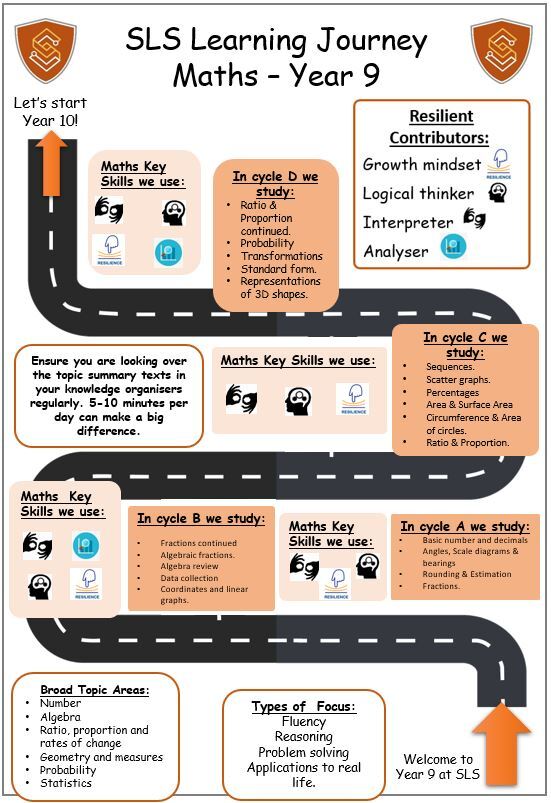
|
Cycle A |
Basic number and decimals Angles, Scale diagrams & bearings Rounding & Estimation Fractions. |
|
Cycle B |
Fractions continued. Algebraic fractions. Algebra review Data collection Coordinates and linear graphs. |
|
Cycle C |
Sequences. Scatter graphs. Percentages. Area & Surface Area. Circumference & Area of circles. Ratio & Proportion. |
|
Cycle D |
Ratio & Proportion continued. Probability. Transformations. Standard form. Representations of 3D shapes. |
Year 10 & 11
Year 10 & 11
Throughout KS4, our learning journey for mathematics aims to ensure that all pupils continue to build upon the foundations acquired at KS3. We aim to ensure all pupils can continue to further develop fluency, mathematical reasoning, and competence in solving increasingly sophisticated problems in relation to the following six disciplines of mathematics: Number; Algebra; Ratio; proportion and rates of change; Geometry and measures’; Probability and Statistics.
Key Stage 4 is a two-year journey that sees students prepare for the Edexcel maths GCSE. This is spilt into 2 tiers- Higher & Foundation. Details of the topics studied can be viewed in the Long-Term Plans section below.
Year 10 Foundation
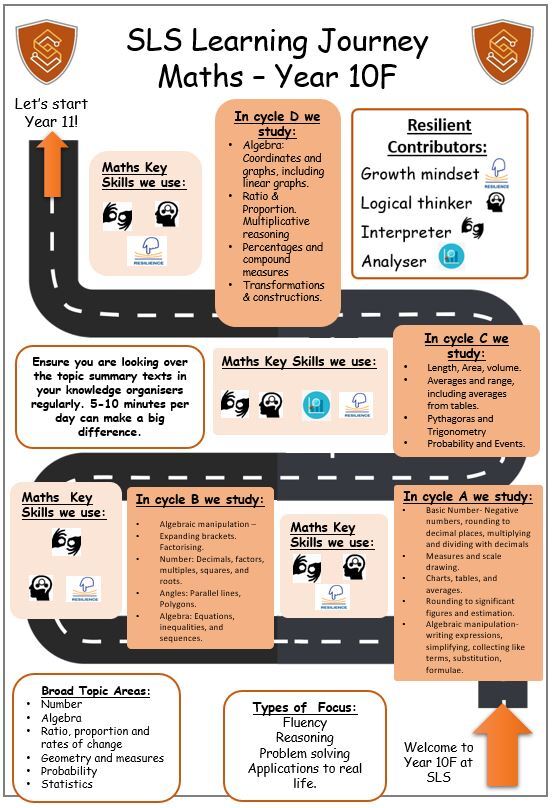
Year 10 Higher
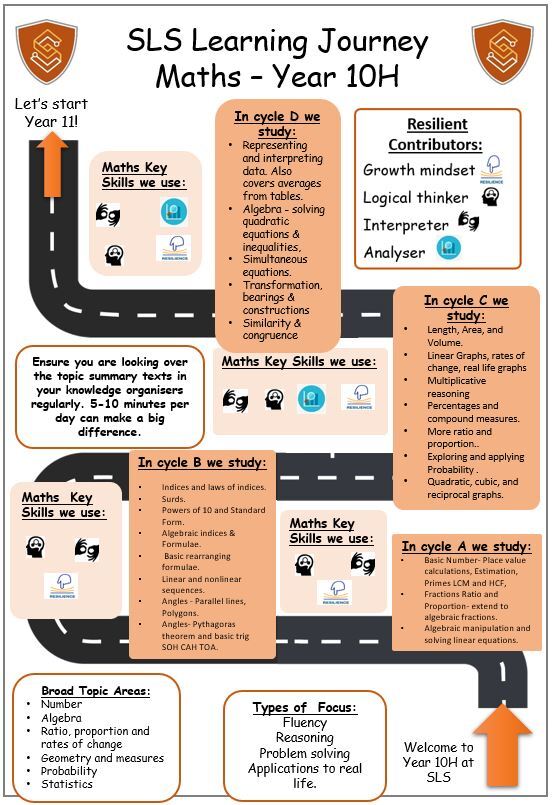
|
TERM 1 |
Term 1: Higher: Basic Number- Place value calculations, Estimation, Prime factor decomposition, LCM and HCF, Fractions Ratio and Proportion- extend to algebraic fractions. Algebraic manipulation and solving linear equations. Foundation: Basic Number- Negative numbers, rounding to decimal places, multiplying and dividing with decimals Measures and scale drawing. Charts, tables, and averages. Rounding to significant figures and estimation. |
|
TERM 2 |
Higher: Indices and laws of indices. Surds. Powers of 10 and Standard Form. Foundation. Algebraic manipulation- writing expressions, simplifying, collecting like terms, substitution, formulae. Algebraic manipulation – Expanding brackets. Factorising. |
|
TERM 3 |
Higher: Algebraic indices & Formulae. Basic rearranging formulae. Linear and nonlinear sequences. Angles - Parallel lines, Polygons. Angles- Pythagoras theorem and basic trig SOH CAH TOA. Foundation: Number: Decimals, factors, multiples, squares, and roots. Angles: Parallel lines, Polygons. Algebra: Equations, inequalities, and sequences. |
|
TERM 4 |
Higher: Length, Area, and Volume. Linear Graphs, rates of change, real life graphs, line segments. Foundation: Length, Area, volume. Averages and range, including averages from tables. |
|
TERM 5 |
Higher: Multiplicative reasoning- Percentages and compound measures. More ratio and proportion. Exploring and applying Probability. Quadratic, cubic, and reciprocal graphs. Representing and interpreting data. Also covers averages from tables. Foundation: Pythagoras and Trigonometry Probability and Events Algebra: Coordinates and graphs, including linear graphs. Ratio & Proportion. |
|
TERM 6 |
Higher: Algebra - solving quadratic equations & inequalities, Simultaneous equations. Transformations, bearings & constructions. Similarity & congruence. Foundation. Ratio & Proportion continued. Multiplicative reasoning- Percentages and compound measures Transformations & constructions. |
Year 11 Foundation
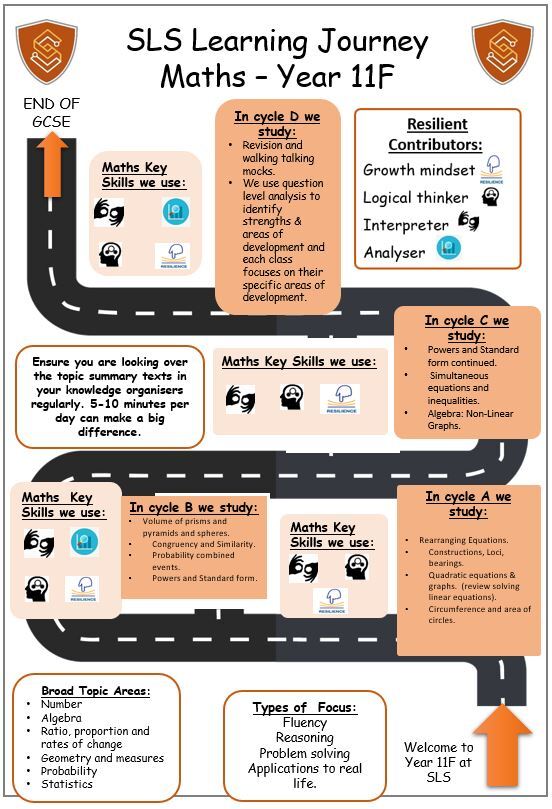
Year 11 Higher
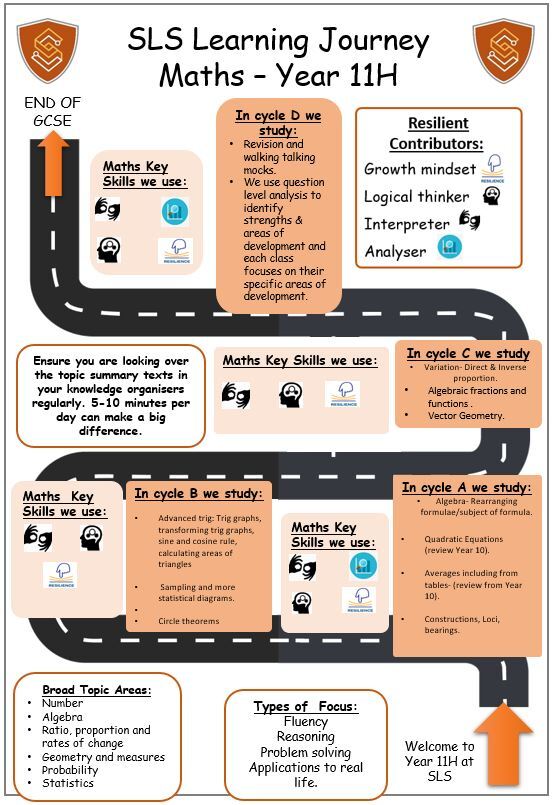
|
TERM 1 |
Higher: Quadratic Equations (review Year 10). Averages including from tables- (review from Year 10). Sampling and more statistical diagrams. Advanced trig: Trig graphs, transforming trig graphs, sine and cosine rule, calculating areas of triangles. Solving equations graphically. Foundation: Constructions, Loci, bearings. Quadratic equations & graphs. Circumference and area of circles, volume of prisms and pyramids. Congruency and Similarity. |
|
TERM 2 |
Higher: Circle theorems Variation- Direct & Inverse proportion. Foundation: Congruency and Similarity. Probability combined events. Powers and Standard form. |
|
TERM 3 |
Higher: Algebra- Rearranging formulae/subject of formulae. Algebraic fractions and functions Vector Geometry Foundation: Powers and Standard form continued. Simultaneous equations and inequalities. Algebra: Non-Linear Graphs. |
|
TERM 4 |
Higher: Revision and walking talking mocks. Foundation: Revision and walking talking mocks. |
|
TERM 5 |
Higher: Revision and walking talking mocks. Foundation: Revision and walking talking mocks. |
|
TERM 6 |
Not applicable. |
Advice for Parents & Carers
Encourage a growth mindset: Help your child understand that maths is a subject that can be learned and mastered with practice and perseverance. Remind them that people like Ada Lovelace, Alan Turing, and Charles Babbage, all of whom were born in London and Kent area, were able to make significant contributions to mathematics despite facing challenges and obstacles.
Provide opportunities for practice: Practice is essential for success in maths. Encourage your child to complete their homework, practice math problems, and take advantage of online resources such as Century and websites like Corbett maths, which offer tutorials and practice problems for a wide range of maths topics.
Help them understand the relevance of maths: Maths is not just a subject that students have to learn in school, but it is also important in everyday life. Show your child how maths is used in the real world, such as in cooking, budgeting, and understanding the news.
Communicate with your child’s teacher: Stay informed about what your child is learning in maths lessons using the long-term plans above and talk to their teacher if you have any concerns. Ask for suggestions on how you can support your child at home.
For teenage math enthusiasts, encourage them to pursue their interest in math by encouraging them to participate in math competitions, such as the UK Mathematical Trust (UKMT) or join chess club at school. They can also look into summer math programs, such as the ones offered by the University of Cambridge or Imperial College London.
If you are able to, borrow or provide resources for self-study: Encourage your child to explore maths on their own by providing them with books, videos, or websites that align with their interests and level. A few popular resources for teenage maths enthusiasts include books like "The Number Devil" by Hans Magnus Enzensberger, or websites like "Mathologer" or "Numberphile".
Remember that every child is different and what works for one child may not work for another. Be patient and persistent in your efforts to support your child in maths, and most importantly, be a positive role model. Show them that you value and respect mathematics, and they will be more likely to do the same.
At Key Stage 3 we use Pearson’s Exdecel textbooks and whilst there is no expectation to purchase these for home use parents can buy these from online marketplaces.
The departmental Knowledge Organisers that are published each learning cycle are an invaluable tool in preparing students for their end of cycle assessments.
In addition, the following websites (mentioned earlier), are especially useful to students. We encourage you to support your child to use them for independent studies:
Corbettmaths.com –https://corbettmaths.com
BBC bitesize maths - Maths - BBC Bitesize
Drfrostmaths - www.drfrostmaths.com
mathsgenie.co.uk-www.mathsgenie.co.uk
















